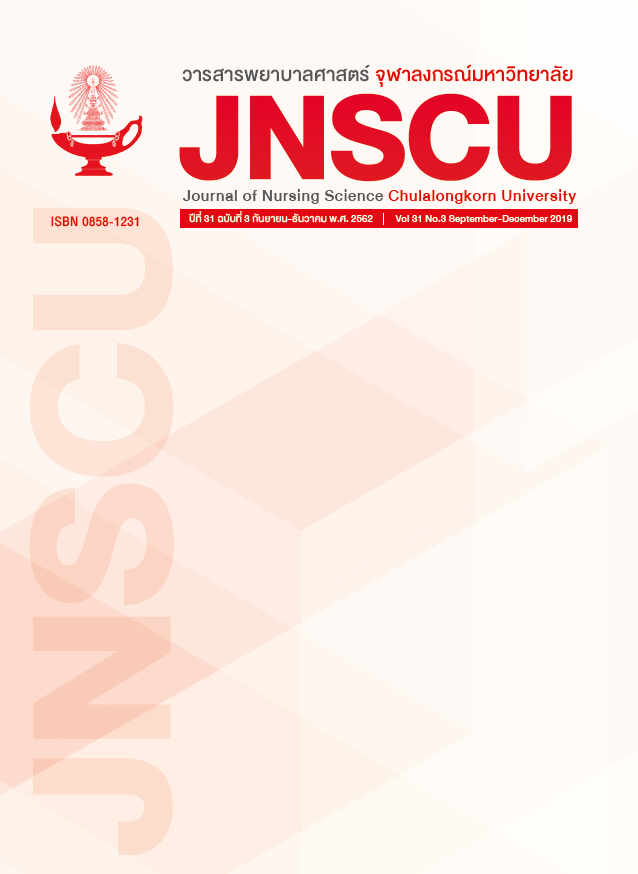การพยาบาลผู้ป่วยวัยรุ่นโรคมะเร็งกลับเป็นซ้ำที่ได้รับการดูแล แบบประคับประคอง
คำสำคัญ:
วัยรุ่นโรคมะเร็ง, กลับเป็นซ้ำ, การดูแลแบบประคับประคองบทคัดย่อ
บทความนี้มีวัตถุประสงค์เพื่อเสนอแนวทางการพยาบาลผู้ป่วยวัยรุ่นโรคมะเร็งกลับเป็นซ้ำที่ได้รับการดูแลแบบประคับประคอง เนื่องจากเป็นกลุ่มที่ได้รับความทุกข์ทรมานจากโรคมะเร็งทั้งทางด้านร่างกายและจิตใจ การกลับเป็นซ้ำของโรคมะเร็งจัดเป็นภาวะที่รุนแรง เนื่องจากมีการแพร่กระจายของเซลล์มะเร็งไปยังอวัยวะต่างๆ ซึ่งมักรักษาไม่หาย โดยขึ้นอยู่กับสุขภาพของผู้ป่วย ขณะเดียวกันผู้ป่วยวัยรุ่นโรคมะเร็งกลับเป็นซ้ำมักได้รับผลกระทบระยะท้าย (Late effects) จากการรักษาครั้งก่อน ร่วมกับผลข้างเคียงจากเคมีบำบัดในการรักษาครั้งใหม่ส่งผลให้ร่างกายมีความทรุดโทรมมากขึ้น ซึ่งการดูแลรักษาผู้ป่วยในกลุ่มนี้ ถ้ามุ่งมั่นจะใช้วิธีการรักษาให้หายทั้งๆ ที่มีโอกาสน้อย ย่อมเป็นการบั่นทอนคุณภาพชีวิต การดูแลแบบประคับประคองด้วยการเลือกใช้ชีวิต เน้นการบรรเทาความเจ็บปวด ทุกข์ทรมาน และป้องกันภาวะแทรกซ้อน เพื่อให้มีคุณภาพชีวิตที่ดีขึ้น ไม่ได้มุ่งหวังให้หายขาดจากโรค อาจเป็นทางเลือกที่ดีกว่า ผู้ป่วยวัยรุ่นโรคมะเร็งกลับเป็นซ้ำมีความแตกต่างจากวัยรุ่นที่มีสุขภาพดีและวัยรุ่นโรคมะเร็งที่กำลังรักษาอยู่ ดังนั้นผู้ป่วยวัยรุ่นโรคมะเร็งกลับเป็นซ้ำต้องใช้ความพยายามในทุกด้านเพื่อดำรงชีวิตอยู่ต่อไปในช่วงเวลาที่เหลืออยู่ รวมถึงความต้องการการดูแลอย่างเฉพาะเจาะจงในหลากหลายแง่มุมจากการเจ็บป่วยด้วยโรคมะเร็งในครั้งใหม่นี้ และเริ่มการดูแลแบบประคับประคอง เพื่อให้สอดคล้องต่อลักษณะการดำเนินโรคที่มีโอกาสหายขาดน้อย ตลอดจนความสามารถเผชิญกับปัญหาต่างๆ ที่คุกคามทั้งทางด้านร่างกาย จิตใจ จิตวิญญาณ และสังคม เพื่อให้มีคุณภาพชีวิตที่ดีขึ้นและสามารถใช้ชีวิตอยู่กับโรคมะเร็งที่กลับเป็นซ้ำได้อย่างเหมาะสมต่อไป
เอกสารอ้างอิง
National Cancer Intitute. Hospital-Based Cancer Registry [Internet]. 2015 [cited2019 Sep 5]. Available from: http://www.nci.go.th.
Information and Technology Division National Cancer Institute. Hospital–based Cancer Registry [Internet]. 2018[cited 2019 July 5]. Available from:http://tcb.nci.go.th/CWEB/cwebBase.do?mode=.
Nuchprayoon I. Pediatric Palliative care. In: Lerdsngunchai P, Nuchprayoon I, Chadkaew P, Sitthipon C, editors. The end of life care. Bangkok: Uksornsompan; 2010. p. 351-67.
Baker KS, Toogood AA, Hawkins M, Nathan PC. Adolescent and young adult cancer survivors: late effectsof treatment. In:A Bleyer, R Barr, L Ries, J Whelan, J Ferrari, eds. Cancer in Adolescents and Young Adults. 2nd ed. Cham: Springer;2017. p. 687‐ 710.
Kyle T, Carman S. Essentials of Pediatric Nursing . 2nd ed. Philadelphia: Lippincott Williams & Wilkins; 2013.
Treenai S, Chaiyawat W. Illness experience of adolescent pateints with leukemia.Thai Journal of Nursing Council 2012; 21(3), 7-13. (In Thai)
Cataudella DA, Zelcer S. Psychological experiences of children with brain tumors at end-of-life: parental
perspectives. Journal of Palliative Medicine 2012; 15(11): 1191-7.
Stegenga K, Ward SP. On receiving the diagnosis of cancer: the adolescent perspective. Journal of Pediatric
Oncology Nursing 2009; 26(2): 75-80.
Wilson K, Mazhar W, Rojas CT, De RV, Van CL. A glimpse into the lives of 3 children: Their cancer journey. Journal of Pediatric Oncology Nursing 2011; 28(2): 100-06.
Wannaphak T, Treenai S. “Continuing life” Of Adolescents With Cancer Relapse Receiving Palliative Care. Journal of Nursing Science Chulalongkorn University 2019; 31(1): 37-48. (In Thai)
Foster TL, Bell C, Harris J, Gilmer M. Palliative nursing care for children and adolescents
with cancer. Nursing: Research and Reviews 2012; 11(1): 17-25.
Flavelle SC. Experience of an adolescent living with and dying of cancer. Arch Pediatr Adolesc Med 2011; 165(1): 28-32.
Himelstein BP, Hilden JM, Boldt AM, Weissman D. Pediatric palliative care. The New England Journal of Medicine 2004; 350(17): 1752-62.
Wolfe J, Hammel JF, Edwards KE, Duncan J, Comeau M, Breyer J, et al. Easing of suffering in children with cancer at the end of life: is care changing?. Journal of Clinical Oncology 2008; 26(10): 1717-23.
World Health Organization guidelines on the pharmacological treatment of persisting pain in children with medical illness.Geneva Switzerland: WHO; 2012.
Sousa, ADRS, Silva LFD, Paiva ED. Nursing interventions in palliative care in Pediatric Oncology: an integrative
review. Revista brasileira de enfermagem 2019; 72(2): 531-40.
Cataudella DA, Zelcer S. Psychological experiences of children with brain tumors at end-of-life: parental
perspectives. Journal of Palliative Medicine 2012; 15(11): 1191-7.



